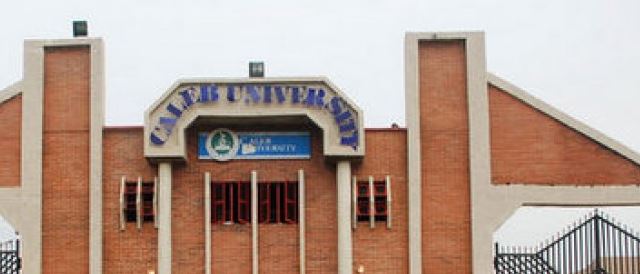

By Adesina Wahab
Professor Nosa Owens-Ibie is a communication expert and the Vice-Chancellor of Caleb University, Imota, Lagos. In this interview, he speaks on the ranking of universities, the future of journalism among other issues. Excerpts:
TIMES Higher Educational, THE, recently came up with its ranking of universities globally, how would you describe the performance of our universities and how can that be improved on?
The THE ranking is part of the process of ensuring standards in the universities and to improve quality of what the universities have to offer. It is a wake up call for us all. There is no institution in the society that will not benefit from value addition to the system.
READ ALSONPA hands over shipyard to NIMASA for floating dock
The ranking is encouraging, that some Nigerian universities are among the first 800 globally is not too bad. The fact that South Africa dominated the list from Africa means we have to do more.
Some institutions are committed to excellence and at Caleb University, we are committed to excellence and standards. Here, we are enhancing quality and building character and we are daily exploring options to make things better.
Universities require a lot of funding and there is also a framework in which the entire package is offered. It may not necessarily be the most funded university that would be the best. Everything must have to be within a framework and context and this must be in clear manner that will be in tandem with the best global practices. Developing and using a curriculum that will make your students competitive is important. The needed manpower is also vital. From what we have seen so far, where our people would go outside the country and shine like a million stars, indicates that we don’t lack the human resources, if we harness all and with adequate funding provided, we can go places.
We have about 180 public and private universities and Egypt with 43 private and public universities was rated better than us, do we still need more universities?
The variables to consider are many. In India for instance, ICT has become the in thing. It was not like that before. But they worked on achieving that powerfully and diligently. Having a large number of institutions does not distract from quality. Competition should make each university do what is called comparative advantage. It is not the size that determines that quality will be ensured. There are parameters to determine how you are rated and the commitment to education in various countries differ.
To me, the question is, is it a liability to have more universities? We have 99 licensed private universities now, is that inimical to the system or is it a liability to do so based on the performance of the existing ones? The truth is that various institutions are trying to define and carve their own niche. Caleb University is the leader in Mass Communication, Computer Science, Architecture among others and the National Universities Commission, NUC, recognises that. These courses are attracting a lot of interests from the public. There are many institutions offering the same courses, why is Caleb University getting the attention in them? It is because we meet and even surpass the expectation of the public and that we have done something different that others have not done. We are also still reworking the template.
Let me tell you this, some of our new students, when they saw what we have to offer in these areas, told us that they did not know we are doing exploits in those courses and that they would tell their friends to come over to Caleb University. The NUC has the prerogative to license universities and to me, they should license more. It is now left for the universities to go to the market and make the difference.
Recall that at a time, typewriter was the thing in vogue, if the computer was not developed and did not come to the market, how would we have seen the technological progress we have made in that respect? The league of the richest people in the world now has people whose businesses are ICT-based as members. If there was no computer and we had to make do with typewriter, then such would not have happened. There are new entrants into the education sector like Caleb University who are gradually becoming world beaters and who are keeping the older ones on their toes.
TETFund said private universities are set up to make profit and therefore would not be supporting them with grants. What is your take on this?
We are in a democracy and it is defined as the government of the people by the people and for the people. Government is for everybody in the society. Private universities are part of the society too. We collaborate with public universities and what unites us is the development of Nigeria.
The institutions of the government should also back the government by ensuring that their actions are for the greater number of people. If the government finds out that all those that are supposed to be in universities are there, it is a plus for them. First of all, a typical student here is a Nigerian who is committed to the cause of the country. Private universities help to provide access for tertiary education for the citizens. We ensure that there is no break in the academic calendar. You need to see the potential of our students to know that such great endeavours as starting a private university should be supported.
We are discussing with the Fund and I believe it will take us to the point that we will begin to benefit from the activities and interventions of the Fund. We pay taxes and produce graduates for our society. I am confident the Fund would do a critical assessment of the situation and do the needful.
What positive changes have you brought into the system and your vision for the university?
To the glory of God, Caleb University is better today than ever before. I thank God and the owner for the opportunity to serve. We came to office with a System Review mantra to ensure better results and more progress and a lot of work is being done. When the COVID-19 pandemic began, we had the challenge of whether to stop academic activities entirely, but rather than doing that, we migrated to online teaching and learning. We did that seamlessly and we were able to conclude our second semester for the 2019/2020 academic session. We held our convocation without any hitch and we train our staff and students on how to adjust to the new normal. Before the pandemic, in collaboration with the Lagos State University, LASU, we developed a Health and Safety App. That was very useful when the pandemic started.
We held our Parent Forum and our parents built a clinic and gave us an ambulance. We have started a Graduate Development Scheme where our alumni are coming back to help build the system.
ICT education has become part of the requirements for graduation here and a lot of infrastructure have been provided. We have developed mobile applications called Caleb Watch for students and Caleb Connect for parents and alumni. We have the vision of making Caleb University a world beater in the near future.
Some people say private universities are dumping grounds for those who have poor results in UTME and WAEC exams as long as their parents have the means to pay, they would secure admission into a private university.
Every year the Joint Admissions and Matriculation Board, JAMB, meets with universities to decide cut- off marks and we don’t go below that. For anybody to say private universities are for the rejected ones is wrong. Even anybody that wants to transfer to us here, there is a point we don’t allow for transfer and when we allow that, a thorough screening process is followed.
What about candidates who pick Caleb University as their first choice from the word go? We emphasise quality and we don’t compromise.
As a communication expert, what future do you envisage for traditional journalism, I mean the print media?
Traditional journalism will always be relevant and news will always be news. The print media is changing into a new form that is taking cognisance of the dynamics of the time. We have to think out of the box. Journalism has gone beyond radio, television and hard copies of newspapers. The profession is changing drastically and the custodians must move with the dictates of the time. They must be in tune with the realities of today, though we have online and print editions, each with its own unique market and audience. There will never be a time when we won’t need to have newspapers.
There is no way people won’t want to communicate as people want to know what is happening around them. Social media has also come to stay and is going to give the traditional media a very stiff competition. The competitor has come to take over your space but that should energise you if you are serious as journalism practitioners.
Vanguard News Nigeria
The post Traditional journalism won’t die, will always remain relevant — Caleb VC appeared first on Vanguard News.


















Advertise your business here at cheap rate and get large audience to your market. Call/Msg Teemikemedia: 07060733664 to get started.